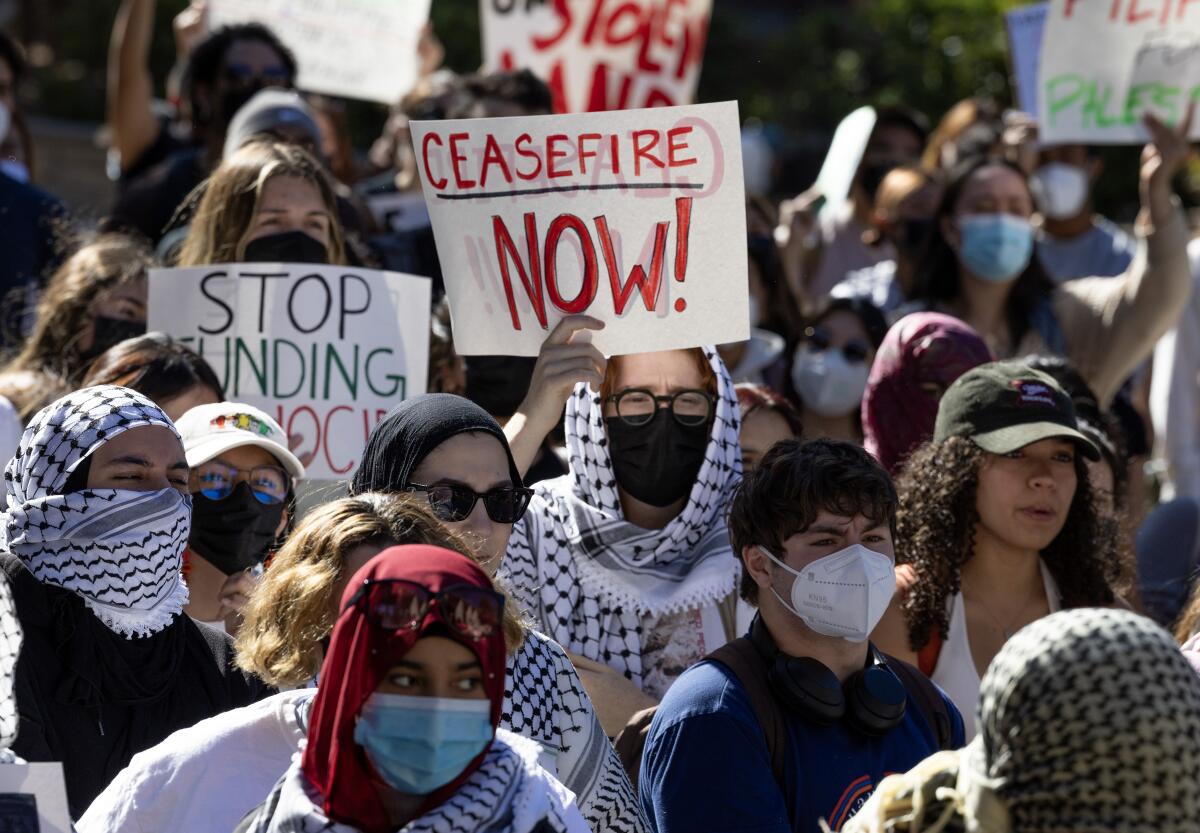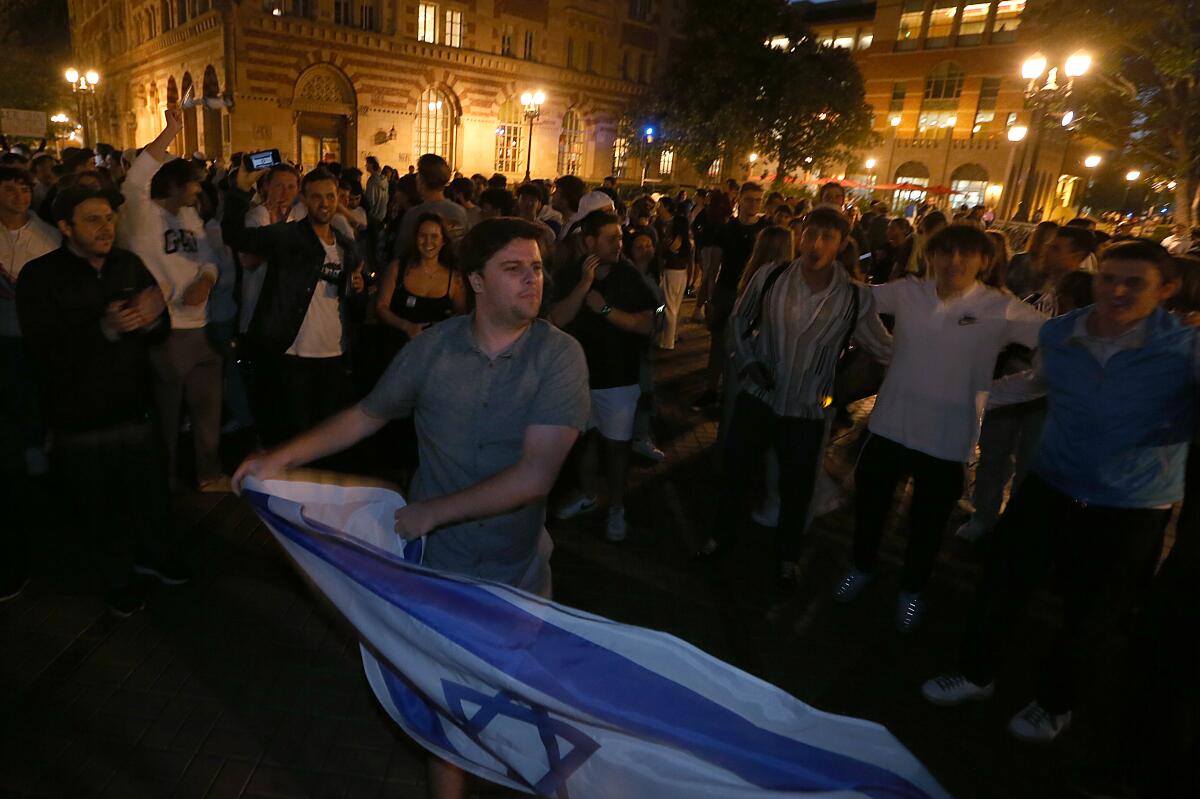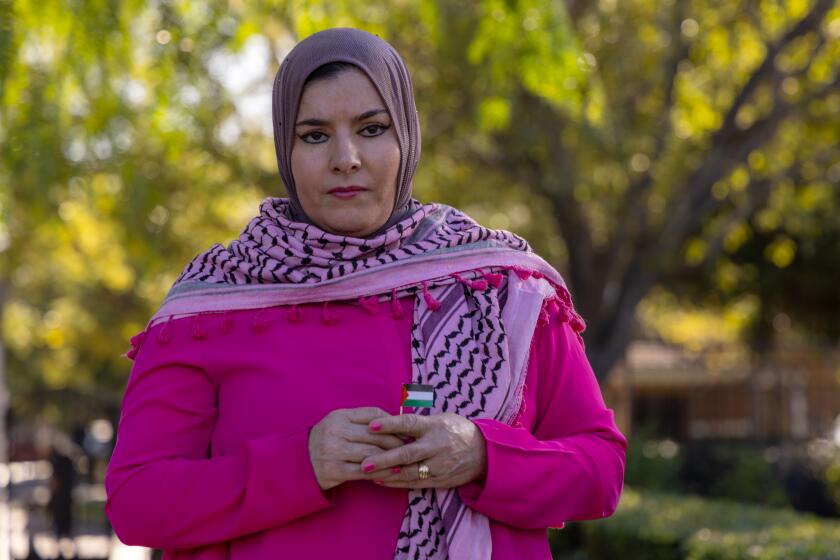Israel-Hamas war roils UC over the line between free speech and unacceptable behavior

- Share via
At UC Davis, a professor posted warnings to “zionist journalists” with emojis of weapons and dripping blood. At UCLA, some students beat a piñata of Israeli Prime Minister Benjamin Netanyahu while a teach-in about “the crisis in Palestine” drew so many threats the organizers moved it online. At UC San Diego, UC Santa Cruz and UCLA, academic departments have issued political statements variously condemning Israel or the militant group Hamas, locked in a war that has killed thousands of civilians in the land both claim as their rightful home.
Across the University of California, scores of students on both sides are reporting harassment, intimidation and profound anxiety over their safety during what many longtime UC faculty and administrators say is the most emotionally charged time they’ve ever experienced on campus.
Five weeks into the Israel-Hamas war, the repercussions are roiling the nation’s premier public university system — and raising challenging questions over the line between free speech and unacceptable behavior under campus codes of conduct.
The issue quickly took center stage Wednesday at the UC Board of Regents meeting at UCLA’s Luskin Conference Center amid tight security in anticipation of protests, with campus officers stationed at entrances and the building encircled by a chain-link fence.
In public comments, students and other speakers decried rising antisemitism, and one said UC officials are falsely accusing Palestinian supporters of antisemitic behavior.

UC President Michael V. Drake acknowledged their anger and fear. Then, saying “words alone are not enough,” he announced a $7-million infusion of funds to help ease the campus conflicts.
The funds include $3 million for emergency mental health services and $2 million to develop educational programs at every UC campus with aims to better understand antisemitism and Islamophobia, combat extremism and provide a viewpoint-neutral history of the Middle East. Another $2 million will be used to train UC leadership, staff and faculty on how to navigate their roles as educators around the issue, focusing on freedom of expression, diversity, equity and inclusion.
Drake also announced that the system’s director of community safety would convene additional meetings with UC police and campus safety officers to ensure staff are appropriately responding to incidents of violence.
The Israel-Hamas war has sparked an increase in harassment, but Palestinian Americans also report shows of support for their businesses.
In addition, a systemwide office of civil rights, which has been in the works since late last year, will be launched in spring with new offices for disability rights and for anti-discrimination efforts.
“The war in Israel and Gaza presents a complex set of intersecting issues that require multiple solutions on multiple fronts,” he said Wednesday. “Today we are doubling down on who we are: an educational institution that’s guided by facts and data, but also a moral compass that helps us find our way to compassion and understanding in difficult moments.”
UC Board of Regents Chair Rich Leib said he met with Arab, Jewish and Muslim students and acknowledged their feelings of anger and tension. He urged campuses to pour resources into safety measures, swiftly condemn inappropriate behavior and enforce rules against it, and call out hate speech, even if protected by the 1st Amendment.
“I will not stand silently ... when members of our university community are made to feel unsafe,” Leib said.
The regents were scheduled to meet in closed session later in the day over the legal issues related to free speech as they face rising demands to take stronger action.
Israel supporters are calling on university leaders to fire the UC Davis professor, better police pro-Palestinian campus rallies and bar the posting of statements about the conflict by UC departments. Supporters of Palestinians are accusing campus leaders of neglecting their reports of harassment and issuing lopsided statements that condemn Hamas and grieve the killing of at least 1,200 people in Israel without equally strong language criticizing the Israeli military response, which the Palestinian Health Ministry said has killed more than 11,200 people in the Gaza Strip.
The furor over free speech has engulfed campuses nationwide. A faculty member who spoke out in support of Palestinians at Emory was placed on leave; another accused of targeting Jewish students was suspended at Stanford. A USC faculty member who told pro-Palestinian student protesters that he wanted all Hamas members killed has shifted to remote teaching.
Brandeis University withdrew campus recognition of the pro-Palestinian group Students for Justice in Palestine. The State University System of Florida moved to do likewise at two campuses but placed the plan on hold after the system head expressed legal concerns over such an action.
“There is absolute chaos over these issues — it’s everywhere, coast to coast,” said Alex Morey, director of campus rights advocacy for the Foundation for Individual Rights and Expression. “What a lot of people are trying to do is target speech that is offensive to them. But the 1st Amendment is meant to stop government from being in control of our actions and words.”
A Wall Street Journal op-ed by professor Steven Davidoff Solomon recommended against hiring students who ‘support discriminatory bylaws or other acts and resolutions blaming Jews and Israelis for the Hamas massacre.’
Morey said that under the 1st Amendment, the only types of speech that can be barred at public universities, even under campus codes of conduct, is “discriminatory harassment” and “true threats.” Under a 1999 U.S. Supreme Court ruling, she said, discriminatory harassment between students requires a showing of targeted, discriminatory conduct that is “so severe, pervasive and objectively offensive, and that so undermines and detracts from the victims’ educational experience, that the victim-students are effectively denied equal access to an institution’s resources and opportunities.”
Behavior that rises to a “true threat” must be a “serious expression of intent to commit an unlawful act of violence targeted to a group or individual,” she said.
But how to decide what behavior crosses the line is provoking vastly different responses on campuses.
At UCLA, for instance, more than 300 faculty members have signed a letter demanding that campus leadership denounce pro-Palestinian rallies that cross the line from protected free speech to “unlawful incitement.” They specified the definition includes celebrating Hamas violence, issuing event advertisements that feature images of weapons or violence, and chanting “intifada,” an Arabic word that in the Palestinian context means uprising or rebellion against the Israeli occupation of the West Bank and Gaza.
We “all cherish the First Amendment and its guarantees of freedom of speech and assembly. ... It is inconceivable why such celebrations are not denounced by the UCLA leadership, regardless of political views,” the letter said, calling on students or community groups that participate in them to be held “accountable. ... The atmosphere on campus results in Jewish students, staff, and faculty who are afraid to be on campus, show solidarity with Israel, or practice their freedom of religion in public.”
To Saree Makdisi, a UCLA English professor, assertions that such rallies amount to violent incitement are absurd.
“What these people are asking for is the policing of speech on campus that ... prohibits speech with which they disagree,” Makdisi said. “They don’t want campuses to be a zone of free speech and free thought and open inquiry. This is absolutely repressive censorship that runs exactly contrary to what the function of a university ought to be and it is completely unacceptable.”
Political statements about the war on UC department websites have also drawn fire. The UC San Diego ethnic studies department, for instance, has posted a statement grieving the loss of lives on both sides and supporting calls to end Israel’s occupation and dismantle “the apartheid system that creates the suffocating, dehumanizing conditions that can lead to resistance.” UC Santa Cruz’s critical race and ethnic studies department has posted a call for academic institutions to “act now to end Israel’s genocidal attack on Gaza.”
At UCLA, the Asian American Studies Center kicked up a furor in 2021 when it posted a statement — along with colleagues in feminist, Middle Eastern and gender studies — decrying a surge in Israeli violence against Palestinians as “the latest manifestation of seventy-three years of settler colonialism, racial apartheid, and occupation intended to terrorize and displace” them. The UCLA Y&S Nazarian Center for Israel Studies has also posted a statement condemning the “horrific terrorist attack” by Hamas and mourning deaths on both sides.
Some critics are calling for UC to ban departments from posting such statements.
But James Steintrager, UC Academic Senate chair, said a systemwide faculty committee reviewed the issue in 2021 after the UCLA controversy and concluded, in consultation with university attorneys, that departments had the right to weigh in on political and social issues, although they cannot endorse candidates. The Academic Senate provided guidelines, such as making clear the statement represented faculty members or groups and not the university itself and ensuring that minority or dissenting views are not squelched.
Morey, the campus free speech expert, agreed that such statements are legal, but she called them “ill-advised” because of the potential to chill the speech of those who might disagree with them. She added that her organization frequently gets such complaints from faculty.
Morey also said the UC Davis faculty member’s conduct was probably also legal even if profoundly offensive.
In screenshots of the now-deleted post on X, formerly Twitter, Jemma Decristo, assistant professor of American studies at UC Davis, posted under her account @jemmaisOKeh that “zionist journalists who spread propaganda & misinformation” were a group that was easily accessible to the public. She said in the post that “they have houses w adddresses, kids in school,” and “they can fear their bosses, but they should fear us more.” The post ends with a knife emoji, followed by a hatchet emoji and emojis of three drops of blood.
UC Davis Chancellor Gary May called the comments by Decristo “revolting in every way” and said the case would be investigated for possible violations of the campus code of conduct in consultation with legal counsel regarding 1st Amendment rights. Morey said she did not believe the post was targeted enough at specific people with a serious intent to commit an unlawful act of violence to rise to the level of an actionable “true threat.”
“It’s close to the line but not there yet,” she said.
Likewise, she added, pummeling a Netanyahu piñata was protected free speech because the object of the beating was an effigy, not an actual person.
Meanwhile, students on all sides say that greater actions must be taken to help them feel safer from what many are experiencing as a hostile campus environment.
The UCLA chapter of Students for Justice in Palestine has posted on Instagram reports of harassment and violence against their supporters. Students selling kaffiyehs on campus were shoved; those who tried to watch an online teach-in about the conflict were accosted by young men who screamed profanities at them and threw laptops in the trash can, and a woman stormed into the office of an allied student group, the Cultural Affairs Commission, and threatened those inside with sexual violence and femicide, the posts said.
“SJP at UCLA is outraged by multiple hate crimes inflicted on UCLA students that have been attacked and violently threatened because of their refusal to remain silent against the ethnic cleansing and occupation of the Palestinian people,” the group posted. “We demand action from the University to protect their Palestinian and supporting students.”
Jewish students are also feeling afraid and helpless, said Bella Brannon, president of the Hillel student board. She said some students have received death threats from their pro-Palestinian peers and have been frightened by swastikas drawn on cars and graffiti on a nearby building exhorting people to “eat the rich, hunt down Jew vampires.” They also are afraid of getting lower grades from faculty members who endorse Hamas, she said.
To them, Brannon said, the pro-Palestinian rallying cry, “From the river to the sea, Palestine is Arab,” is a call for the ethnic cleansing of Jewish people from the land they call Israel. She said they were afraid to wear Star of David necklaces and skullcaps known as kippot and introduce themselves with Jewish names.
UC Student Regent Merhawi Tesfai, a UCLA doctoral student, said the issue has divided students more than any other he has experienced in his six years at UC. There was no clear way forward, he said, but inaction was not an option.
“How do people feel safe and advocate for their communities and make sure there is not political warfare?” he asked. “We need to find a way to achieve that.”
More to Read
Sign up for Essential California
The most important California stories and recommendations in your inbox every morning.
You may occasionally receive promotional content from the Los Angeles Times.














